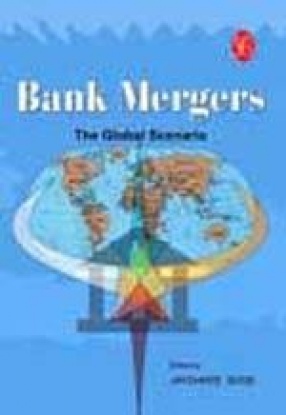
Jayshree Bose

Showing all 16 books







This comprehensive book on medical tourism focuses on many crucial issues that have not been detailed earlier. Medical tourists travel as cross-border patients to other countries to avail of internationally benchmarked healthcare services at considerably low cost. This is mainly on account of some restrictive factors in their own country of origin: cost disadvantage, under insurance or lack of insurance, long wait periods, or, inadequate healthcare facilities for ...

This comprehensive book on medical tourism focuses on many crucial issues that have not been detailed earlier. Medical tourists travel as cross-border patients to other countries to avail of internationally benchmarked healthcare services at considerably low costs. This is mainly on account of some restrictive factors in their own country of origin: cost disadvantage, under insurance or lack of insurance, long wait periods, or, inadequate healthcare facilities ...

The book is divided into four sections. The first section of the book highlights various forms of violence and discrimination against women. It discusses issues of crucial importance such as female foeticide and infanticide, poor educational facilities for women, health-care, nutrition and restrictions on women in matters of inheriting property. It also points out that a significant portion of women’s work is unpaid, why such work is not considered for ...

Traditionally, most issues relating to public finance, particularly those associated with budget-related resource allocation and expenditure, have been shrouded in secrecy. This is because they were the preserve of reticent governments averse to sharing information about budgets with citizens, and more so, allowing minority stakeholder citizens to have any say on them. The result was that stakeholder needs were not adequately reflected in budgets. Today, the ...

An economy's prosperity is generally measured by specific indicators like international prices, costs of external financing, capital flows and trade flows. Rise in interest rates, tightening monetary conditions, nevertheless, natural calamities and disasters like the 9/11 and the resultant global imbalances in recent times have led economists worldwide to think of an impending recession. The year 2006 saw the US stating a Current Account Deficit of more than ...

Due to liberalization, financial reforms in India have taken giant strides, particularly in banking. However, the area of strategic banking consolidation still needs attention. Consequently, Indian banks have remained mute spectators to two global mega merger waves that overtook most of the global economy, despite the need for economies of scale and scope that can only come from size, the impending and more stringent Basel 2 regulatory capital norms, the imminent ...

This book attempts to exercise a rare restraint in two very crucial and controversial areas of global bank mergers by blindly extolling the virtues of mega bank mergers and the ceaseless flow of economies of scale it supposedly brings; and to resist the temptation of being US-centric. It projects the contrarian viewpoint that argues against indiscriminate mergers. It also analyses almost every type of impact bank mergers may have on economies of scale, ...

Countries have exploited the advantages of a globalized world and thrown open their economies to Foreign Direct Investment (FDI), which is a major driver of economic growth, today. FDI is crucial for the overall development of a country because it augments capital, employment and productivity within a country. This book is a comparative study of two countries, India and China. Although the two countries are a study in contrast, as far as their approach to ...

Gross Domestic Product (GDP) as an indicator of the economic progress of a nation was first structured as an indicator of wartime productivity during World War II. But since then, the concept of GDP has fallen short on many counts, in spite of the stature it has come to command. This results in severe distortions since it does not yet distinguish between economic activity that contributes to a nation's well being and what detracts from it.

Corporate espionage brings out the pressures of competition in the corporate sector in an age where information and knowledge are power and dictate either success or failure. This innocuous practice of obtaining competitive intelligence has given way to a highly unscrupulous trend of hiring spies—often from within the victim organization—to act as a conduit for confidential information for use as a competitive advantage in business. Here, loyal employees ...

Although the phenomenon of insider trading has existed in the global stock markets since the decade of the fifties, it was only in the seventies that regulators actually became vigilant about this form of speculation, popularly known as the victimless crime. The slow take-off in regulation was because of a host of reasons. One was the dilemma surrounding insider trading. Opinion on this issue is sharply polarized. On one hand, there are many who extol its ...

The last two decades have seen a massive upsurge in insurance claims arising from catastrophes, both natural and man-made. Earlier, claims were within manageable limits, and reinsurers rarely reneged on commitments. But catastrophes seemed to have entered a high intensity mode since 1992. Reinsurance capacities are strained to the utmost, and even highly rated reinsurers have exited the market. Today, prime among these risk transfer mechanism options are captive ...

Although frauds and scams in the financial sector are generally on the rise, insurance frauds pose a hazard that is essentially very different. When the perpetrator gets away with the crime, it constitutes not just a breach of 'utmost good faith'; there is also a drop in the insurer’s ability to meet genuine claims, although the commitment remains. This calls for large-scale capital infusion at a time when the industry is already reeling from massive claims ...

Over the past decade, there has been a paradigm shift in the way the Indian banks have been functioning. From being branch centric, they have become technology centric, thereby enabling e-banking. In turn, e-banking has helped banking become customer-oriented and totally demand driven by offering customers highly focused services and products. However, this technological revolution in banks meant that older employees be reoriented and re-trained, besides banks ...

Hurricanes, earthquakes, cyclones, tsunamis, volcanoes, floods, and forest fires—today, the private insurance industry is grappling with the arcane New Generation Mega Disaster concept. This book explores catastrophe insurance in the context of the changing face of both natural and manmade catastrophes, their insurability, and the government’s role in catastrophe insurance or reinsurance.

Everyday, we read reams about how India is emerging as a global frontrunner in the realm of Information Communication Technology (ICT). But one ICT-enabled revolution that is flowing quietly like an undercurrent, eclipsed by the IT revolution, is getting ignored in the bargain. This book unearths the undercurrent, the rapid growth in e Governance projects in India, through which the government is not only facilitating online citizen services like bill and tax ...
